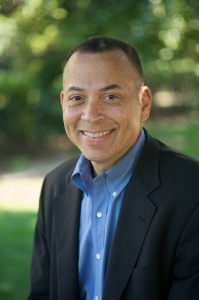BY MICHAEL NEWSOM
W. Ralph Eubanks (B.A. ’78), a publisher, editor and author, among other titles, recently donated his papers to the University of Mississippi’s Archives and Special Collections at the J.D. Williams Library.
The UM graduate has authored two books, Ever Is a Long Time: A Journey into Mississippi’s Dark Past, A Memoir and The House at the End of the Road: The Story of Three Generations of an Interracial Family in the American South. He gave the university copies of his proposals for the two books, manuscripts, correspondence with editors and other documents.
Eubanks, who lives in Washington, D.C., with his wife, Colleen, and their three children, had used the archives while working on his books and said the collection was a great help.
“When the library approached me about giving them my papers, it was a very easy answer,” Eubanks said. “I just know how much care they put into featuring the special collections there. I’ve worked in the special collections as a patron and know how they serve the collection too.”
Jennifer Ford, UM head of archives and special collections and associate professor, said Eubanks’ papers will be useful to many.
“We are so excited about this donation by such a talented author to Special Collections,” Ford said. “I know the collection will be heavily used by our patrons interested in Mississippi’s history, culture and literary heritage.”
Eubanks graduated from Mount Olive High School in Mount Olive, Miss., in 1974 and enrolled at UM after only having visited the campus briefly. He graduated with a bachelor’s degree in psychology and also holds a master’s degree in English language and literature from the University of Michigan.
Presently, Eubanks is editor of the Virginia Quarterly Review, a literary magazine based at the University of Virginia. During his long and distinguished career, he was director of publishing at the U.S. Library of Congress. He was also director of book publishing for the American Psychological Association. He has written articles for the Washington Post Outlook and Style sections, the Chicago Tribune, Preservation magazine and National Public Radio. Eubanks received the 2007 Guggenheim Fellowship from the John Simon Guggenheim Foundation and has been a fellow at the New American Foundation.
Papers housed at UM’s Archives and Special Collections have been helpful to Eubanks during his career. While researching his 2003 book Ever Is a Long Time, he read the papers of James Meredith, who integrated UM in 1962, which led to a deadly riot on campus by those who opposed a black student attending the university. Reading Meredith’s hate mail was a powerful experience, he said.
“It really helped me pull together my chapter “Rebel Flags and Bullet Holes” in Ever Is a Long Time, Eubanks said. “When I went through those papers and I looked at the hate mail he got, I don’t think I knew the depth of the hatred he had endured there. I had some very superficial sense of what that was. It was very difficult for me to imagine how strong it was. Those papers made it very real to me.”
Watch CSPAN VIDEO: Book Discussion on Ever Is a Long Time>>
In the years since Eubanks graduated, he’s seen a lot of positive change at UM. The progress over the last several decades made it easy for him to become more involved with the university. He now serves on advisory boards for UM’s Center for the Study of Southern Culture and the William Winter Institute for Racial Reconciliation. He has also participated in the Oxford Conference for the Book as a speaker and panelist.
“It’s a really nice thing for me to come full circle,” Eubanks said. “If you would have asked me 35 years ago when I graduated if I would have ever given my papers to Ole Miss, I would have said no. For a number of years, I wouldn’t give any money to Ole Miss. For me, it’s about the change that I have seen there that has prompted this move on my part to do this. Rather than staying outside that change, I’m willing to help be a part of helping facilitate it. That’s another reason why I did it.”
